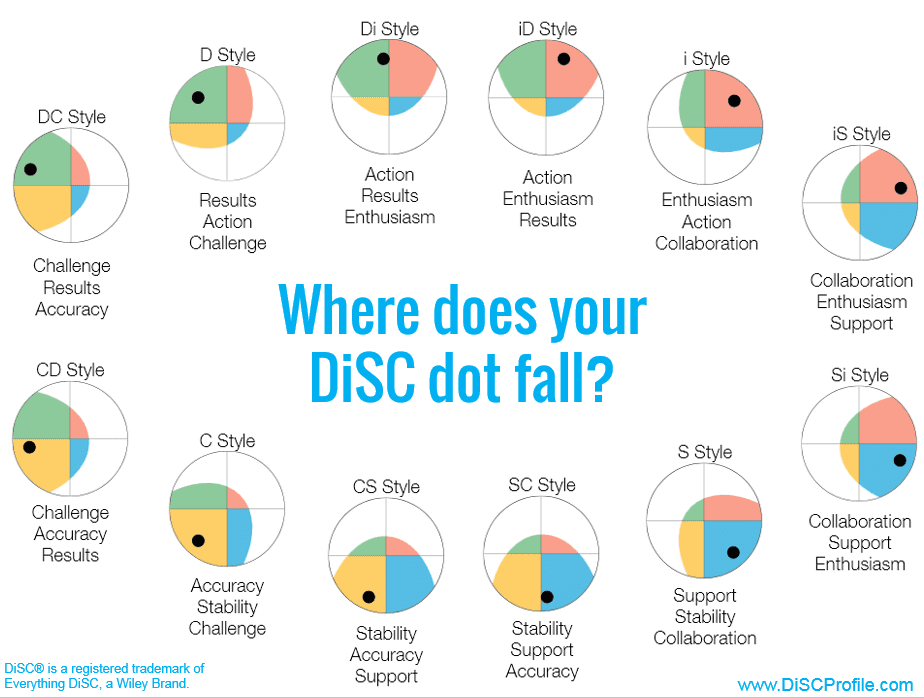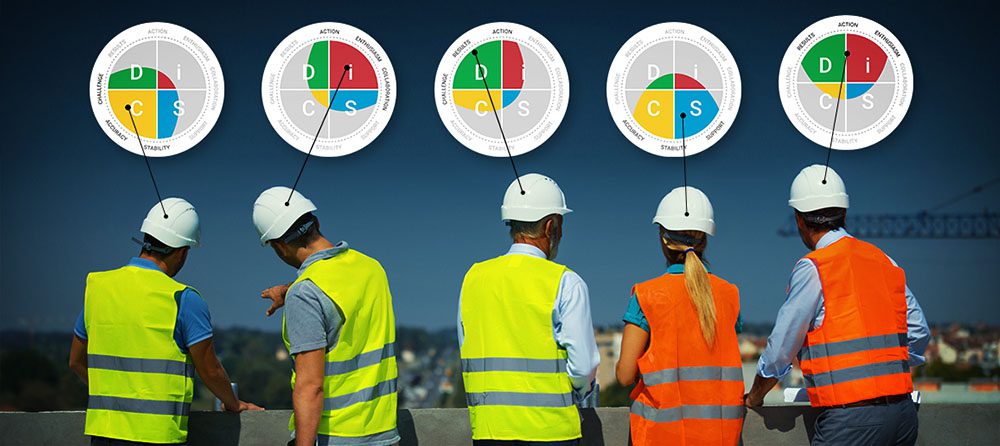We all know the famous quote, “Life is 10% of what happens to you and 90% of how you react to it.” Knowing how you might react to how something is communicated will help you in the workplace to improve on that 90% reaction, producing better results within your workplace relationships. Knowing how others communicate and learning how they might react also helps you understand how to communicate effectively with them for better results.
DiSC® is one assessment tool out there to help you learn more about how you might react or respond in certain situations and how others might react as well. There is no right or wrong DiSC® style. The goal for everyone in the workplace is to work with all communication styles. Construction is a team sport, and when you add Architecture, Engineering, and Development with Investors, Brokers, and Asset Managers, communicating effectively with all workplace styles becomes even more vital for a project’s success. This, in turn, plays into the overall success of your company and your career.
What Is the DiSC Workplace® Profile?
DiSC Workplace® delivers a comprehensive, easily customizable workplace development solution to engage every employee—regardless of title or position, department or function—in building more productive and effective relationships at work.
With combined facilitated classroom training and online pre-work and follow-up tools, you can create a personalized learning experience to help participants understand and appreciate the different priorities, preferences, and values each individual brings to the workplace and how they can learn to adapt to the styles of others.
DiSC® is a research-validated online assessment. Once completed, you receive a 20-page workplace-specific profile report to help participants:
- Discover their own DiSC® style, recognizing the priorities, motivators, and stress triggers that shape their workplace experience
- Explore other styles, understanding the differences and similarities among the DiSC® styles
- Identify strategies to make more meaningful connections with colleagues of various styles and work more effectively to reduce tension, solve problems, and contribute positively to their organizations
A facilitator report that accompanies the participant report helps participants further understand their unique DiSC® style and validate any concern with the report being slightly different from the general report they receive for their closest match.

The communication styles above show how individuals who profile within them tend to prioritize communication with the listed identifiers. For example, a DC style will prioritize challenge, results, and accuracy. When you communicate with a DC, they may ensure everything is complete, question what you might have forgotten, or ask if you double-checked or had a second person check. They are not communicating that way to doubt your work or discredit you as a person. They are inherently inclined to challenge the status quo, achieve results, and ensure details are covered. On the other hand, if you communicate with a Di, they will prioritize action, results, and enthusiasm. They share the commonality of results with a DC, although they may find a DC communicates too bluntly and slows their pace down. A DC may find the Di is not as detail oriented as they are, even reckless at times. One profile is not better than another; it is the mutual ability to communicate when something needs clarification or may have caused offense.
Those who profile as high DCs tend to excel in operations roles. The best way to communicate with a DC is to focus on giving them the information they need to securely move forward. Your relationship with a DC will struggle if they are held back in making decisions because they feel they have not been given all the information, the information they have been provided is ambiguous or could be incorrect, or they have not been given information in time to weigh all the options. If you work with a DC, getting them only the information they need, having it for them when they need it, or clearly communicating when you will have the information they need to move forward will solidify the relationship and help you earn their trust and respect. Let them ask questions on what you provide, rather than presenting or talking through information. They may shut down on you if you need more verbal interaction in the workplace.
A Di is focused on getting it done, and they do not require or even necessarily work well in a lot of structure. Dis lend themselves to highly relational roles, such as real estate sales, property management, and other jobs that require developing relationships, which is due to their motivation for drive and interactions with less structure and stability. They tend to work best teamed with a detailed support personnel. They can be unorganized and unpunctual for meetings and get stressed in highly technical situations. When communicating with a Di, focus on getting to them quickly what they need to do their job and helping them present the information effectively to maintain the relationships they are responsible for upholding. In construction, you can have successful Dis who have developed high accuracy and make excellent project managers supported by project engineers or project administrators (although, if not teamed with detail-oriented team support or given too many projects, they tend to talk too much from being overwhelmed and miss critical details or deadlines). When communicating with a Di, avoid discussions about their performance and focus on how they are. They will communicate how they are struggling in performance in the way they relate to the people and team around them.
CS, SC, S, and Si all share the need to support others, yet the Si does not share the priority of stability, so they tend to resign faster when they no longer feel they are helping or supporting a team or company’s effort. When communicating with those in the S spectrum, make sure to let them know they are making a difference.
Having been a DiSC® certified coach for over a decade, it is rewarding to see how far I, my team, and others we have done the DiSC® assessment with have advanced in recognizing our communication styles and learning to effectively communicate with others of varying styles.
If you would like to complete a DiSC® assessment for yourself or your team at your place of business, you can reach us at 305-361-0094 x10.
To Better Understanding through Improved Communication,
Suzanne Breistol





This is very helpful information, Suzanne. Thank you.